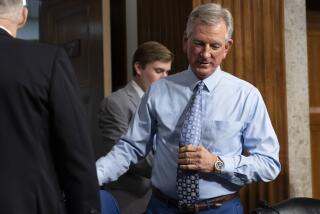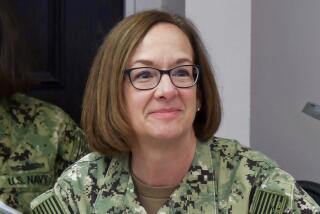NAMING NEW GENERALS A KEY STEP IN SHIFT ON IRAQ
WASHINGTON — President Bush intends to name two new military commanders to oversee the war and help establish a new direction in Iraq as part of his shift in strategy to be announced next week, according to a Defense official.
Navy Adm. William J. Fallon, currently the commander of all U.S. forces in East Asia and the Pacific, will be nominated as the new head of the U.S. Central Command, the military headquarters responsible for operations in the Middle East, replacing retiring Army Gen. John P. Abizaid.
And Army Lt. Gen. David H. Petraeus, a veteran of two tours in Iraq, will be named to become the new four-star commander in Iraq, replacing Army Gen. George W. Casey Jr. Both nominations must be confirmed by the Democratic-controlled Senate.
The changes would be among the first major steps in Bush’s overhaul of his Iraq policy. They were first reported Thursday night by ABC News and confirmed by the Defense official, who requested anonymity because the announcement was pending.
Although Abizaid and Casey were expected to leave their posts early this year, Bush’s decision to name their successors at about the time he unveils his revised strategy is a signal of how thoroughly he intends to break from past policies, which he recently acknowledged are failing.
The choice of Petraeus in particular could have wide-ranging significance. Although his selection does not come as a surprise, Petraeus is closely associated with the push for a more complex counterinsurgency campaign, which would move U.S. soldiers out of their large bases and into smaller outposts in troubled neighborhoods.
Advocates of such a plan argue that it is the only way to gain the confidence of Iraqi civilians and protect them from attack. Abizaid and Casey have resisted such moves, arguing that a more visible U.S. presence would inflame locals and prevent Iraqi forces from shouldering the security burden.
Petraeus rose quickly through the ranks after earning praise for commanding the 101st Airborne Division during the March 2003 Iraq invasion.
“Dave Petraeus may be the most talented person I ever met,” retired Army Gen. Barry McCaffrey said in a recent interview. “He’s got phenomenal intellectual gifts.”
Petraeus currently oversees most of the Army’s leading military colleges, where he supervised work on the new Army and Marine Corps counterinsurgency manual, issued last month. The manual advocates multiple manpower-intensive tactics that would break sharply from many of Casey’s views for a lighter U.S. footprint in Iraq.
Bush’s selection of Fallon is more unexpected. Fallon, whose nickname is Fox, would become the first Navy officer to take over the Middle East command since its creation in 1983. Because most threats in the region have been land-based, the Central Command, known colloquially as Centcom, has alternated between Army and Marine generals.
Fallon has been viewed as somewhat out of step with Bush administration policy in Asia. He has advocated closer military relationships with China and downplayed the threat posed by North Korea’s missile program. In contrast, former Defense Secretary Donald H. Rumsfeld repeatedly raised concerns about the North Korean missile program and the lack of transparency of China’s military buildup while he was in office.
Despite Fallon’s differences with Rumsfeld, the former fighter pilot and Vietnam veteran is highly regarded within the Pentagon for his willingness to speak his mind and for his openness to subordinates. If he takes the reins at Centcom in March, when Abizaid is expected to retire, he will have served as head of the Pacific Command for only a year.
Fallon was not Bush’s first choice to head the Pacific Command when he was nominated in January 2005.
The White House had originally nominated Air Force Gen. Gregory S. Martin but was forced to withdraw that selection after Sen. John McCain (R-Ariz.) objected to his ties to an Air Force officer involved in a procurement scandal.
The selection of a Navy officer to head Centcom could signal the Pentagon’s interest in devoting more attention to countries in the region other than Iraq.
Pentagon officials have raised concerns about the smuggling of weapons and personnel by terrorist groups on the region’s seas, and any military move against Iran would probably rely heavily on ship-based missiles and fighter aircraft.
Times staff writer Julian E. Barnes contributed to this report.
More to Read
Sign up for Essential California
The most important California stories and recommendations in your inbox every morning.
You may occasionally receive promotional content from the Los Angeles Times.










